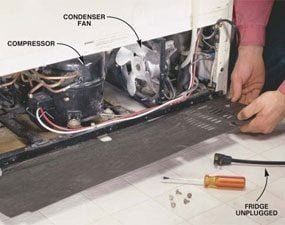A noisy fridge is not necessarily dangerous, but it can indicate a problem. Addressing the issue promptly can prevent further damage.

A noisy fridge often signals an underlying issue with the compressor or other components. Ignoring these sounds can lead to more significant problems, including higher energy bills and potential appliance failure. Common causes of fridge noise include a malfunctioning compressor, worn-out condenser fan, or issues with the evaporator fan.
Identifying the source of the noise is crucial for effective repair. Regular maintenance and timely repairs can extend the lifespan of your fridge, ensuring it operates efficiently. By addressing noisy fridge issues early, you can maintain a quiet kitchen and avoid costly repairs in the future.
Noisy Fridge Causes
A noisy fridge can be quite annoying. It can also be a sign of something wrong. Understanding the causes of fridge noise helps in fixing the issue. Below are common reasons for a noisy fridge and how to identify them.
Common Reasons
- Loose Parts: Loose parts can create rattling sounds.
- Condenser Fan Issues: A faulty fan can be very loud.
- Evaporator Fan Problems: This fan inside the fridge can also make noise.
- Compressor Noise: The compressor can be noisy if it’s failing.
- Vibration: The fridge might vibrate if it’s not level.
Identifying The Noise
Identifying the source of the noise is crucial. Follow these steps:
- Listen Carefully: Determine if the noise comes from inside or outside.
- Check the Back: Inspect the back of the fridge for loose parts.
- Inspect the Fans: Check both condenser and evaporator fans.
- Observe the Compressor: Listen to the compressor for unusual sounds.
- Level the Fridge: Ensure the fridge stands evenly on the floor.
| Component | Common Issue | Noise Type |
|---|---|---|
| Condenser Fan | Dirty or Broken | Loud Whirring |
| Evaporator Fan | Blocked or Icy | Grinding Sound |
| Compressor | Worn Out | Buzzing |
Potential Dangers
A noisy fridge can cause concern for many. It might indicate underlying issues. Understanding potential dangers helps keep your home safe.
Safety Concerns
Some noises from your fridge might be harmless. Unusual sounds could signal a problem. These issues may pose safety risks.
- Electrical faults: These can lead to fires.
- Gas leaks: Escaping refrigerant gas is harmful.
- Component failure: Broken parts can cause damage.
When To Worry
Not all noises are dangerous. Recognize the warning signs.
- Loud humming: This could mean a failing compressor.
- Clicking sounds: This might indicate electrical issues.
- Grinding noises: Parts may be wearing out.
If these sounds persist, it’s time to act. Addressing them promptly ensures safety.
Basic Troubleshooting
A noisy fridge can cause concern. It may disrupt your peace and suggest deeper issues. Basic troubleshooting can often resolve these issues. Before calling a professional, try these steps.
Initial Checks
Begin with simple inspections. Ensure the fridge stands level on the floor. Use a spirit level to check. If the fridge tilts, adjust its feet.
Check the fridge’s contents. Overloading can strain the compressor. Arrange items to allow airflow. Clean the condenser coils. Dust can accumulate and cause noise. Unplug the fridge and use a brush or vacuum to clean.
Simple Fixes
Listen to the noise source. Is it from the back, bottom, or inside? This helps identify the problem.
If the noise comes from the back, check the condenser fan. Dust or debris can block it. Clean the fan with a soft brush.
Noises from the bottom may involve the drain pan. Ensure it sits correctly. If loose, adjust it until secure.
For internal noises, inspect the evaporator fan. It may ice up. Defrost the fridge if ice blocks the fan.
| Noise Source | Possible Cause | Solution |
|---|---|---|
| Back | Condenser Fan | Clean the fan |
| Bottom | Drain Pan | Adjust the pan |
| Inside | Evaporator Fan | Defrost the fridge |
Follow these basic steps to address a noisy fridge. They can often resolve minor issues quickly.
Compressor Issues
A noisy fridge can be annoying, but it might also be a sign of a problem. The compressor is a crucial part of your fridge. It ensures your food stays cold and fresh. Understanding compressor issues can help you keep your fridge in good condition.
Signs Of Compressor Problems
Knowing the signs of a faulty compressor can save you time and money. Here are some common signs:
- Loud humming or buzzing sounds coming from the fridge.
- Fridge not cooling properly, despite adjusting the thermostat.
- Clicking noises when the compressor starts or stops.
- Overheating at the back of the fridge.
Repair Vs. Replacement
Deciding between repair and replacement can be tricky. Here’s a guide to help you:
| Situation | Action |
|---|---|
| Compressor making loud noises | Consider repair if the fridge is less than 5 years old. |
| Fridge not cooling at all | Replacement might be necessary for older models. |
| Minor issues like clicking sounds | Repair could be a cost-effective solution. |
| Repeated problems after repairs | Consider replacing the fridge to avoid further issues. |
If you decide to repair, here are some steps:
- Unplug the fridge and locate the compressor.
- Check for any visible damage or loose parts.
- Clean the condenser coils to improve efficiency.
- Test the start relay by shaking it gently.
- Replace the start relay if you hear a rattling sound.
Always consult a professional if you are unsure about any steps.
Diy Fixes
Is your fridge making a lot of noise? A noisy fridge can be annoying. Sometimes it might also be dangerous. It’s important to fix it. Here are some DIY fixes you can try.
Tools Needed
- Screwdriver
- Multimeter
- Wrench
- Vacuum Cleaner
- Soft Brush
Step-by-step Guide
- Unplug the fridge: Safety first. Always unplug your fridge before starting any work.
- Locate the compressor: The compressor is usually at the back. You might need to remove a panel.
- Check for loose parts: Use your screwdriver to tighten any loose parts you see.
- Clean the condenser coils: Use the vacuum cleaner and soft brush. Clean the coils to remove dust.
- Test the compressor: Use a multimeter to check if the compressor is working properly.
- Replace faulty parts: If the compressor or other parts are broken, replace them.
- Reassemble the fridge: Put everything back together. Plug the fridge back in and check if the noise is gone.
These steps can help you fix a noisy fridge. Keeping your fridge quiet and safe is important.

Credit: www.smartappliance.co.za
Professional Help
Sometimes a noisy fridge requires expert attention. Knowing when to call a technician can save you time and money. Here’s how to find reliable service and what to expect.
When To Call A Technician
If your fridge makes loud noises, it might need professional help. Strange sounds like buzzing, humming, or clicking can indicate serious issues. Here are some signs that you need to call a technician:
- Consistent loud noise even after cleaning the compressor.
- Temperature fluctuations affecting food freshness.
- Water leakage from the fridge.
- Strange odors coming from the fridge.
Professional technicians have the tools and knowledge to diagnose and fix these problems. Do not ignore these signs as they can lead to bigger issues.
Finding A Reliable Service
Finding a reliable fridge repair service is crucial. Here are some tips to help you choose the best technician:
- Research online reviews to see what others say about the service.
- Check certifications to ensure the technicians are qualified.
- Ask for references from friends or family who used the service.
- Compare prices to get a fair deal but avoid cheap offers.
Using these tips, you can find a trustworthy technician to fix your noisy fridge. A reliable service will ensure your fridge runs smoothly and quietly.
Preventive Measures
Fridges can make strange noises, but are they dangerous? Preventive measures are key to avoiding costly repairs. Learn how to maintain your fridge and extend its lifespan.
Regular Maintenance
Regular maintenance is essential for a quiet, safe fridge. Follow these steps for effective upkeep:
- Clean the Coils: Dust and debris can clog coils. Use a vacuum to clean them every six months.
- Check Door Seals: Worn seals cause leaks. Ensure seals are tight and replace if necessary.
- Monitor Temperature: Set the fridge between 37-40°F. The freezer should be 0°F.
- Inspect the Compressor: Listen for unusual noises. If the compressor is noisy, it may need repair.
Extending Fridge Lifespan
Extending your fridge’s lifespan is achievable with simple steps:
- Avoid Overloading: Too much food strains the compressor. Leave space for air circulation.
- Keep It Level: An uneven fridge causes vibrations. Use a level tool to adjust its position.
- Check for Leaks: Water leaks can damage internal parts. Inspect for leaks and fix them promptly.
- Replace Filters: Water and air filters need regular replacement. Follow the manufacturer’s guidelines.
By following these preventive measures, you ensure a quieter and safer fridge. Regular maintenance and proper care extend its lifespan. Keep your kitchen appliance in top shape with these simple tips.

Credit: adk.co.uk
Cost Considerations
Understanding the cost considerations for fixing a noisy fridge compressor is crucial. It helps you make informed decisions about repair or replacement. Let’s break down the costs involved.
Repair Costs
Repairing a fridge compressor can vary in cost. The price depends on the issue’s complexity.
| Component | Estimated Cost |
|---|---|
| Compressor Replacement | $100 – $500 |
| Labor Charges | $50 – $200 |
| Additional Parts | $20 – $100 |
Note: These costs can vary based on your location and fridge model.
Long-term Savings
Investing in repairs can lead to long-term savings. A well-functioning fridge uses less energy, reducing electricity bills.
- Lower energy consumption
- Extended appliance lifespan
- Reduced need for frequent repairs
Sometimes, replacing an old fridge might be more cost-effective. Newer models are often more energy-efficient.
- Assess the repair cost.
- Compare with the price of a new fridge.
- Consider energy savings over time.
These steps help you decide whether to repair or replace your fridge.
Credit: www.quora.com
Frequently Asked Questions
How to Fix a Noisy Fridge Compressor?
Clean the compressor area. Tighten any loose components. Replace worn-out rubber mounts. Consult a professional if noise persists.
Is a Noisy Fridge Compressor Dangerous?
A noisy fridge compressor can indicate a problem. It’s not usually dangerous but should be checked by a technician.
Can a Noisy Fridge Be Fixed?
Yes, a noisy fridge can be fixed. Common issues include dirty condenser coils, faulty fans, or a malfunctioning compressor. Cleaning or replacing parts often resolves the noise. Consult a professional if needed.
Why is My Fridge Suddenly So Loud?
Your fridge might be loud due to a faulty fan, compressor issues, or loose components. Clean the coils and check for obstructions. If the noise continues, consult a technician.
Conclusion
A noisy fridge can be more than just an annoyance. Addressing the issue promptly ensures your appliance’s longevity. Regular maintenance and timely repairs can prevent potential hazards. Follow the tips mentioned above to fix a noisy fridge compressor. Enjoy a quieter and more efficient kitchen environment.


GIPHY App Key not set. Please check settings